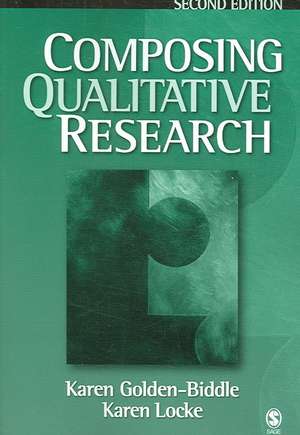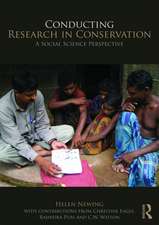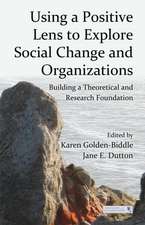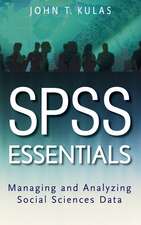Composing Qualitative Research
Autor Karen Golden-Biddle, Karen Lockeen Limba Engleză Paperback – 25 sep 2006
Preț: 515.47 lei
Preț vechi: 696.58 lei
-26% Nou
Puncte Express: 773
Preț estimativ în valută:
98.63€ • 102.98$ • 81.63£
98.63€ • 102.98$ • 81.63£
Carte disponibilă
Livrare economică 14-28 martie
Livrare express 27 februarie-05 martie pentru 20.36 lei
Preluare comenzi: 021 569.72.76
Specificații
ISBN-13: 9781412905619
ISBN-10: 1412905613
Pagini: 144
Ilustrații: black & white illustrations
Dimensiuni: 152 x 229 x 8 mm
Greutate: 0.2 kg
Ediția:Second Edition
Editura: SAGE Publications
Colecția Sage Publications, Inc
Locul publicării:Thousand Oaks, United States
ISBN-10: 1412905613
Pagini: 144
Ilustrații: black & white illustrations
Dimensiuni: 152 x 229 x 8 mm
Greutate: 0.2 kg
Ediția:Second Edition
Editura: SAGE Publications
Colecția Sage Publications, Inc
Locul publicării:Thousand Oaks, United States
Recenzii
"For professionals and students in the social sciences and management, Golden-Biddle and Locke explain how to transform field work experience of qualitative research into journal articles."
Cuprins
Introduction
Writing about Writing
Writing our Fieldwork
Focus on “Story”
Organization of Chapters
The Style and Practice of Our Academic Writing
The Predominant Style of Academic Writing: Unadorned and Disembodied
Experiencing the Practice of Academic Writing
The Style and Practice of Academic Writing: Interested and Persuasive Discourse
Our Writing Task
Crafting a Theorized Storyline
Establishing Theorized Storylines
Developing the Theorized Storyline
Compelling Beginnings
Novel Use of Methodology
Data-Theory Coupling
Storylines with Field and Theory Complications
Characterizing the Storyteller
Storyteller in the Guise of Institutional and Human Scientist
Institutional and Human Storyteller in Relationship to the Studied
Institutional and Human Portrayals as Technically Competent Storyteller
Institutional and Human Scientist as Field Knowledgeable Storyteller
Re-Writing the Story
Re-writing the Manuscript Prior to Journal Review
Re-writing the Manuscript During the Journal Review Process
Re-writing the Articulated Theorized Storylines
Reflections on the Re-Written Manuscripts
Conclusion
Concluding Comments
Appendix: Articles Used as Illustrations
References
Index
About the Authors
Writing about Writing
Writing our Fieldwork
Focus on “Story”
Organization of Chapters
The Style and Practice of Our Academic Writing
The Predominant Style of Academic Writing: Unadorned and Disembodied
Experiencing the Practice of Academic Writing
The Style and Practice of Academic Writing: Interested and Persuasive Discourse
Our Writing Task
Crafting a Theorized Storyline
Establishing Theorized Storylines
Developing the Theorized Storyline
Compelling Beginnings
Novel Use of Methodology
Data-Theory Coupling
Storylines with Field and Theory Complications
Characterizing the Storyteller
Storyteller in the Guise of Institutional and Human Scientist
Institutional and Human Storyteller in Relationship to the Studied
Institutional and Human Portrayals as Technically Competent Storyteller
Institutional and Human Scientist as Field Knowledgeable Storyteller
Re-Writing the Story
Re-writing the Manuscript Prior to Journal Review
Re-writing the Manuscript During the Journal Review Process
Re-writing the Articulated Theorized Storylines
Reflections on the Re-Written Manuscripts
Conclusion
Concluding Comments
Appendix: Articles Used as Illustrations
References
Index
About the Authors
Notă biografică
Karen Golden-Biddle is Professor of Organizational Behavior and Everett W. Lord Distinguished Faculty Scholar at Boston University School of Management. She currently serves as Senior Associate Dean, with responsibility for faculty, research and curricular innovation at the undergraduate and graduate levels. In her research, Karen studies organizational and system change, and has published more than 50 articles and two books: Composing Qualitative Research (Golden-Biddle and Locke, 2007) and Using a Positive Lens to Explore Social Change and Organizations (Golden-Biddle and Dutton, 2012). Her most recent article (2013), "How to change your organization without blowing it up," is published in Sloan Management Review.
Karen is the recipient of a number of teaching awards and was the 2003 recipient of the Robert McDonald Award for the Advancement of Research Methodology from the Academy of Management. She received her BA degree from Denison University and MBA and PhD degrees from Case Western Reserve University. Karen studies organizational and system transformation, and is especially interested in highly professionalized settings such as healthcare and universities with socially significant missions.
Karen is the recipient of a number of teaching awards and was the 2003 recipient of the Robert McDonald Award for the Advancement of Research Methodology from the Academy of Management. She received her BA degree from Denison University and MBA and PhD degrees from Case Western Reserve University. Karen studies organizational and system transformation, and is especially interested in highly professionalized settings such as healthcare and universities with socially significant missions.
Descriere
The Second Edition of Composing Qualitative Research: Crafting Theoretical Points from Qualitative Data offers useful strategies for addressing the writing issues that researchers face when shepherding a manuscript from invention to publication. Authors Karen Golden-Biddle and Karen Locke use real-world examples drawn from a variety of disciplines and publications to demonstrate styles, concepts, challenges, and potential outcomes from writing qualitative research.












